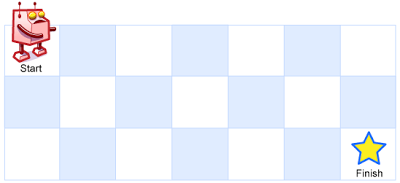2D Dynamic Programming¶
Table of Contents¶
- 62. Unique Paths (Medium)
- 1143. Longest Common Subsequence (Medium)
62. Unique Paths¶
-
LeetCode | LeetCode CH (Medium)
-
Tags: math, dynamic programming, combinatorics
- Count the number of unique paths to reach the bottom-right corner of a
m x ngrid.

62. Unique Paths - Python Solution
# DP - 2D
def uniquePaths(m: int, n: int) -> int:
if m == 1 or n == 1:
return 1
dp = [[1] * n for _ in range(m)]
for i in range(1, m):
for j in range(1, n):
dp[i][j] = dp[i - 1][j] + dp[i][j - 1]
return dp[-1][-1]
print(uniquePaths(m=3, n=7)) # 28
# [[1, 1, 1, 1, 1, 1, 1],
# [1, 2, 3, 4, 5, 6, 7],
# [1, 3, 6, 10, 15, 21, 28]]
62. Unique Paths - C++ Solution
#include <iostream>
#include <vector>
using namespace std;
int uniquePaths(int m, int n) {
vector dp(m, vector<int>(n, 1));
for (int i = 1; i < m; i++) {
for (int j = 1; j < n; j++) {
dp[i][j] = dp[i - 1][j] + dp[i][j - 1];
}
}
return dp[m - 1][n - 1];
}
int main() {
int m = 3, n = 7;
cout << uniquePaths(m, n) << endl; // 28
return 0;
}
1143. Longest Common Subsequence¶
-
LeetCode | LeetCode CH (Medium)
-
Tags: string, dynamic programming
1143. Longest Common Subsequence - Python Solution
from functools import cache
# DP - LCS
def longestCommonSubsequenceMemo(text1: str, text2: str) -> int:
m, n = len(text1), len(text2)
@cache
def dfs(i: int, j: int) -> int:
if i < 0 or j < 0:
return 0
if text1[i] == text2[j]:
return dfs(i - 1, j - 1) + 1
return max(dfs(i - 1, j), dfs(i, j - 1))
return dfs(m - 1, n - 1)
# DP - LCS
def longestCommonSubsequenceTable(text1: str, text2: str) -> int:
m, n = len(text1), len(text2)
dp = [[0] * (n + 1) for _ in range(m + 1)]
for i in range(1, m + 1):
for j in range(1, n + 1):
if text1[i - 1] == text2[j - 1]:
dp[i][j] = dp[i - 1][j - 1] + 1
else:
dp[i][j] = max(dp[i - 1][j], dp[i][j - 1])
return dp[-1][-1]
if __name__ == "__main__":
assert longestCommonSubsequenceMemo("abcde", "ace") == 3
assert longestCommonSubsequenceTable("abcde", "ace") == 3
assert longestCommonSubsequenceMemo("abc", "abc") == 3
assert longestCommonSubsequenceTable("abc", "abc") == 3